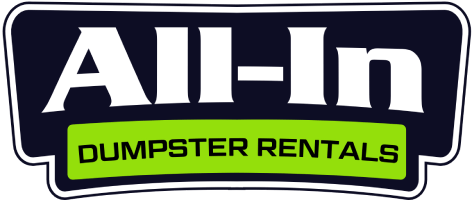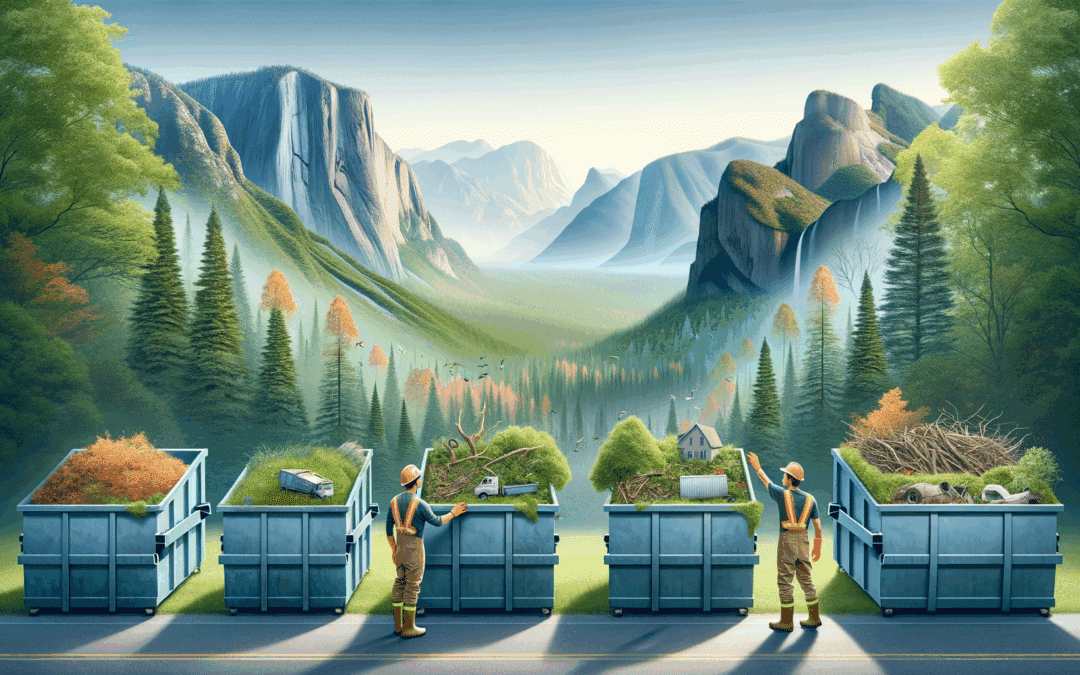Tackling a landscaping project in Western North Carolina comes with unique challenges and opportunities. Our mountain terrain, diverse plant life, and Asheville’s commitment to sustainability all factor into how we approach yard waste disposal. Whether you’re clearing overgrown areas, renovating garden beds, or managing seasonal cleanup, having the right waste disposal solution makes all the difference.
Here in Asheville, where our mountain ecology demands special care, choosing the appropriate dumpster for yard waste isn’t just about convenience—it’s about responsible stewardship of our beautiful surroundings. The rolling hills of Buncombe County are home to countless landscaping projects year-round, and properly managing the debris from these endeavors helps keep our community clean and green.
As locals serving the Western North Carolina area, we’ve seen firsthand how the right dumpster choice can transform yard projects from overwhelming to manageable. Let’s explore how to select the perfect dumpster for your specific landscaping needs in our mountain community.
Understanding Your Yard Waste Profile
Before choosing a dumpster, it’s important to understand what constitutes yard waste and how your specific project affects your disposal needs.
Yard waste typically includes grass clippings, leaves, branches, shrub trimmings, soil, small stumps, and other organic materials from your outdoor spaces. However, not all landscaping projects generate the same type or volume of waste.
A spring cleanup in your Asheville yard might primarily involve leaves and light brush, while a major landscaping renovation could include heavier elements like soil, rocks, and substantial plant material. Understanding your waste profile helps determine the appropriate dumpster size and type.
Take a moment to estimate both the volume and weight of materials you’ll be removing. Remember that wet materials like fresh-cut greenery or soil after a typical Western North Carolina rainfall will weigh significantly more than dry materials.
Sizing Up Your Landscaping Project
Matching your dumpster size to your project scale saves both money and hassle. Here’s a general guide to help Asheville homeowners select the right size:
10-Yard Dumpsters: Perfect for smaller yard projects in typical Asheville neighborhoods. These compact dumpsters handle about 3-4 pickup truck loads and work well for projects like:
– Single garden bed renovations
– Seasonal cleanup in small to medium yards
– Removing a small section of shrubs or brush
– Minor tree trimming projects
10-yard dumpsters fit nicely in driveways without overwhelming the space, making them ideal for many homes in neighborhoods like Montford, West Asheville, or North Asheville where space might be limited.
13-Yard Dumpsters: The versatile mid-range option suits medium-sized projects such as:
– Whole-yard seasonal cleanups
– Multiple garden bed renovations
– Small to medium tree removals
– Light hardscaping projects with plant removal
This size works well for properties throughout Henderson and Buncombe counties where projects are substantial but not massive in scale.
15-Yard Dumpsters: For larger landscaping endeavors, especially on the more spacious properties common in areas like Fairview, Leicester, or Black Mountain, consider our largest option:
– Complete yard overhauls
– Major tree removal projects
– Land clearing for new garden installations
– Large-scale hardscaping with significant plant removal
Remember that in our mountainous terrain, accessibility can sometimes be challenging. Ensure your drop-off location is accessible and that the dumpster size you choose can be placed safely on your property.
Weight Considerations for Yard Waste
One of the most common mistakes in selecting a dumpster for landscaping projects is underestimating weight. This is especially true in our Western North Carolina climate, where soil tends to be rich and often moisture-laden.
While a 10-yard dumpster might seem adequate volume-wise for removing garden soil, the weight can quickly exceed allowances. Here are some rough weight estimates to keep in mind:
– Dry leaves and grass clippings: Relatively light
– Branches and shrub trimmings: Moderate weight
– Soil, mulch, and rocks: Very heavy
If your project involves substantial amounts of soil, rocks, or wet organic material (common after our frequent mountain rain showers), consider selecting a larger dumpster than you might initially think necessary. The weight distribution across a larger container can help prevent overages.
Working with a local company like ours means you benefit from our understanding of typical Asheville yard waste weights and characteristics. We can provide guidance specific to Western North Carolina flora and soil types.
Seasonal Considerations in Asheville
Our Western North Carolina seasons dramatically affect landscaping projects and the associated waste management needs.
Spring: After mountain winters, spring cleanup often involves removing fallen branches, clearing winter debris, and preparing beds for planting. Early spring soil in Asheville is typically very wet, adding considerable weight to your waste.
Summer: Summer projects often generate substantial green waste from pruning and plant removals. Remember that freshly cut vegetation is heavier than you might expect and will compact as it dries.
Fall: Autumn in the Blue Ridge Mountains means leaves—lots of them. While leaves are light, they take up significant volume initially but will compact over time. A dumpster that seems too large at first might be just right as materials settle.
Winter: Though less common, winter landscaping projects often involve hardscaping elements and heavier materials since it’s an ideal time for structural work when plants are dormant.
In Asheville’s climate, it’s also worth considering potential weather delays. Our mountain weather can change quickly, so having flexibility in your rental period is valuable during unpredictable seasons.
Environmental Considerations and Local Regulations
Asheville and surrounding Western North Carolina communities take environmental stewardship seriously. When disposing of yard waste, it’s important to understand local regulations and best practices.
Many organic yard materials can and should be recycled rather than landfilled. Our company works to ensure yard waste is properly processed, with organic materials being composted or mulched when possible, aligning with Buncombe County’s sustainability goals.
Some items require special handling or may not be accepted with standard yard waste:
– Stumps over certain sizes often need separate disposal
– Soil with potential contamination needs appropriate processing
– Invasive species (like certain ivies common in Asheville) may require specific disposal methods to prevent spread
As a local business serving Asheville and surrounding areas, we stay current with regional regulations and can help guide you through compliance requirements for your specific project.
Maximizing Your Dumpster’s Capacity
Once you’ve selected the right size dumpster for your Asheville landscaping project, loading it efficiently helps you get the most value from your rental:
Layer strategically: Place flat or heavy items at the bottom. For example, start with soil or rocks before adding bulkier brush or branches.
Break down larger items: Cut branches into smaller pieces to reduce air gaps and maximize space. This is particularly important when dealing with the varied plant species found in Western North Carolina yards.
Distribute weight evenly: Spread heavy materials across the dumpster rather than concentrating them in one area. This is especially important given the sloped terrain of many Asheville properties.
Avoid overfilling: Materials should not extend above the dumpster walls. Not only is this unsafe during transport on our winding mountain roads, but it may result in additional charges.
Remember that materials will settle over time, especially after rainfall (which we get plenty of in Western North Carolina). What looks like a full dumpster initially may have room for more as contents compact.
Timing Your Dumpster Rental
For landscaping projects in the Asheville area, timing your dumpster rental strategically can improve both efficiency and cost-effectiveness:
Coordinate with your project schedule: Have the dumpster delivered just before you begin generating significant waste. For multi-phase projects, consider whether one longer rental or multiple shorter rentals makes more sense.
Consider weather patterns: Our Western North Carolina weather can be unpredictable, especially in spring and fall. Build flexibility into your timeline to account for the rain delays common in our mountain climate.
Plan for debris generation timing: Most landscaping projects generate waste unevenly. Initial clearing creates the bulk of debris, while finishing work produces less. Schedule your rental primarily around peak debris periods.
Account for accessibility: If your Asheville property has limited access due to narrow driveways or mountain terrain features, coordinate delivery timing when obstacles can be temporarily moved or addressed.
As a local company, we understand the rhythms of landscaping work in Western North Carolina and can help you plan the optimal rental window for your specific project needs.
Alternative Solutions for Specific Situations
While dumpsters are ideal for most landscaping projects, some unique situations in the Asheville area might benefit from alternative approaches:
Junk removal services: For smaller amounts of yard waste or when physical limitations make loading difficult, our full-service junk removal might be more appropriate. This is particularly helpful for many of our elderly residents in retirement communities around Asheville.
Combination approaches: Some projects benefit from both a dumpster for the main waste volume and targeted junk removal for specific items or areas that are difficult to access—a common scenario in our mountainous terrain.
Phased disposal: For extended landscaping projects spanning multiple seasons (not uncommon in elaborate garden renovations throughout Western North Carolina), scheduling several smaller dumpster rentals at key project phases might be more efficient than a single long-term rental.
Our team can help assess your specific situation and recommend the most practical combination of services for your unique Asheville property.
Working With a Local Provider
When managing yard waste in Western North Carolina, working with a local dumpster provider offers distinct advantages:
As Asheville locals ourselves, we understand the specific challenges of mountain properties—from steep driveways to limited access points. Our experience with the terrain helps ensure proper dumpster placement and pickup even in challenging locations.
We’re familiar with regional plant species and typical yard waste compositions in the Asheville area, allowing us to better advise on appropriate dumpster sizes for your specific project.
Our knowledge of local disposal regulations and environmental guidelines ensures your yard waste is handled responsibly and in compliance with Buncombe County requirements.
Most importantly, working with neighbors means you get personalized service and flexible solutions that national chains simply can’t match. We understand the local landscaping cycles and can work with your schedule as weather and project timelines evolve.
Your landscaping project deserves more than a one-size-fits-all approach. By selecting the right dumpster with guidance from local experts who understand Asheville’s unique environment, you can ensure efficient waste management while respecting our beautiful mountain ecosystem.
With the right planning and appropriate dumpster selection, your yard transformation can proceed smoothly, leaving you free to enjoy the natural beauty that makes Western North Carolina such a special place to call home.

